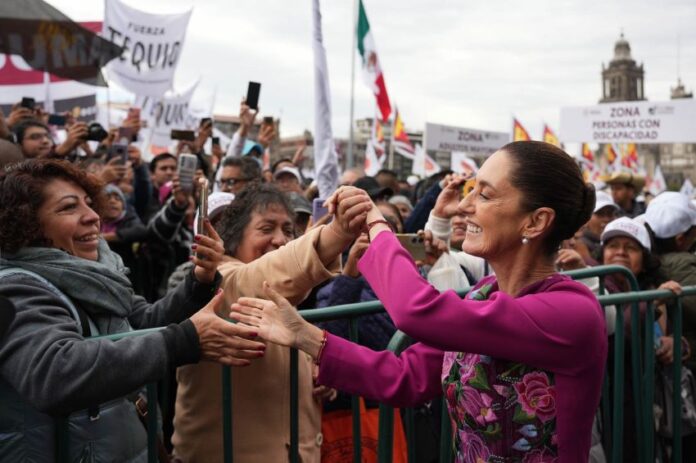President Claudia Sheinbaum delivered an hourlong address in Mexico City’s central square on Sunday, highlighting her government’s achievements during its first 100 days in office and outlining its core commitments and plans for 2025 and beyond.
In front of a packed Zócalo and with her cabinet ministers seated behind her, Sheinbaum also reiterated her belief that Mexico will have a good relationship with the United States during Donald Trump’s second term as U.S. president.
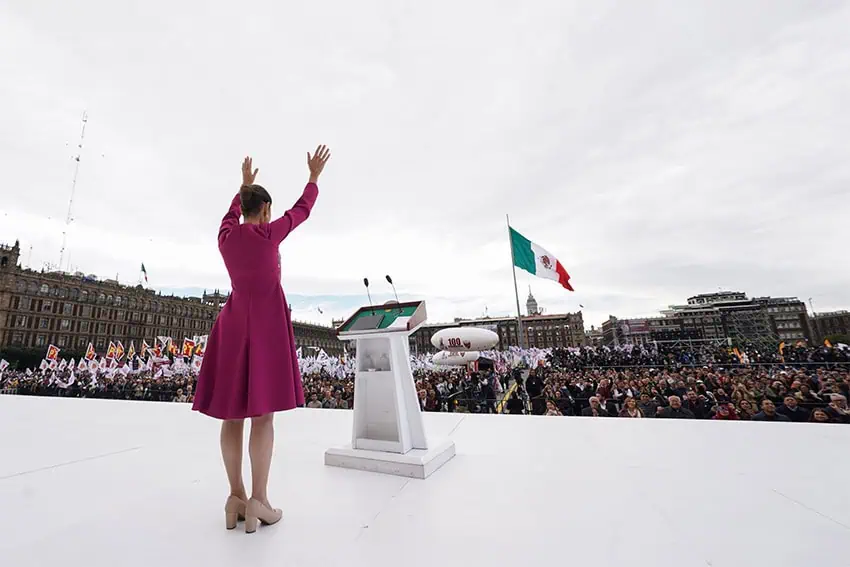
In her opening remarks, Mexico’s first female president said that the purpose of her speech was to be accountable to the citizens of Mexico and to “reinforce our commitment to always be close to the people” and “govern with the people” and “for the people.”
“That is the fourth transformation of public life in Mexico!” she said, referring to the nickname of the political project initiated by former president Andrés Manuel López Obrador.
“… Why do we call [our term in government] the second story of the fourth transformation? Because the foundations … were laid by the best president — Andrés Manuel López Obrador, and it’s up to us to consolidate … and advance with the second story,” Sheinbaum said.
‘It’s time for transformation and time for women’
“Discrimination, racism, classism and machismo are relics of the past,” Sheinbaum declared early in her speech.
“Mexico is changing for the better, even those anchored in the past know that. We are living in exceptional, unique, extraordinary times because it’s time for transformation and time for women,” she said.
Sheinbaum subsequently emphasized the positive aspects of Mexico’s current situation, and enumerated a long list of government achievements during her first 100 days in office, a milestone she reached last Thursday. Among the positives and achievements she highlighted were that:
- The number of people in formal sector jobs hit a record high in December (even though 2024 was the worst year for formal sector job creation since 2020).
- Mexico received almost US $39 billion in foreign direct investment last year.
- Mexico is the United States’ largest trade partner.
- Mexico is the 12th largest economy in the world.
- The Maya Train railroad is now operational in its entirety.
- The judicial reform and numerous other constitutional reforms were approved in the final four months of 2024.
- The minimum wage increased by 12% on Jan. 1.
- The federal government and state governments signed a National Human Right to Water Agreement.
- A new medication purchasing model aimed at ensuring the availability of medications in the nation’s public health system was implemented.
- Various health care facilities were opened.
- The government implemented a new security strategy and homicides declined 16% between September and December (even as high levels of violence continue to plague various parts of the country).
The government’s core commitments
Standing on a white stage on a cloudy and cool Mexico City morning, Sheinbaum said that she and her government were elected to provide “continuity” to the “transformation” initiated by López Obrador (AMLO) when he took office in late 2018.
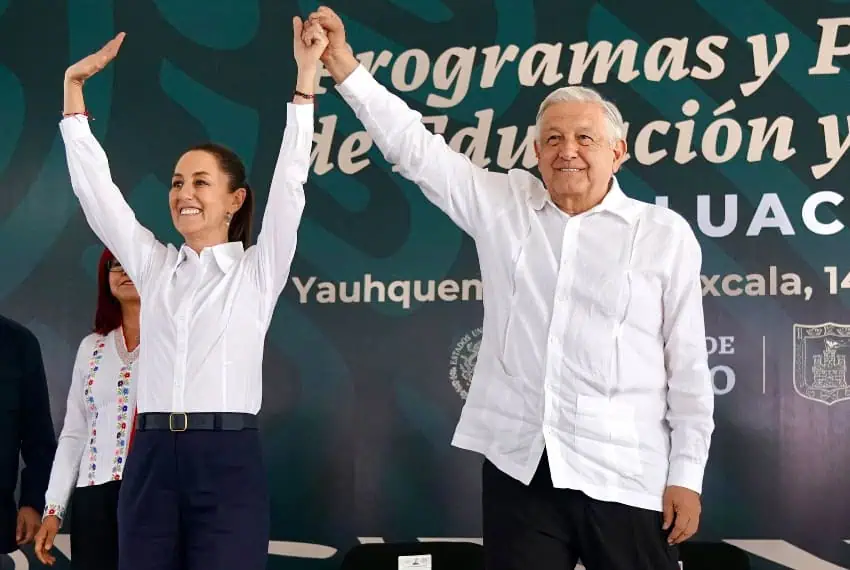
“Some media outlets criticize us [asking], ‘Why don’t we differentiate ourselves? Why do we defend the welfare programs and strategic [infrastructure] projects? Why is there continuity in [AMLO’s political] project?’ But if we always said we would [build on AMLO’s legacy], why the surprise?” the president asked.
Sheinbaum declared that under her leadership, the “neoliberal model” of the past won’t return and the “regime of corruption and privileges” of past governments won’t either.
The president said that her government will continue with the doctrine of “Mexican humanism” developed by López Obrador and obey “the maxim” of “For the good of all, the poor come first.”
“… We don’t betray our principles, we don’t betray our past, we don’t betray our flag and we will never betray the people of Mexico,” Sheinbaum said.
What’s ahead for Mexico in the Sheinbaum era?
Sheinbaum said that June 1, 2025 will be remembered as a significant day in the history of Mexico because “for the first time judges, magistrates and Supreme Court justices will be democratically elected.”
“Let there be no doubt, the judicial power will be autonomous,” the president said, seeking to dispel a major concern of critics of the judicial reform that paved the way for the staging of Mexico’s first judicial elections.
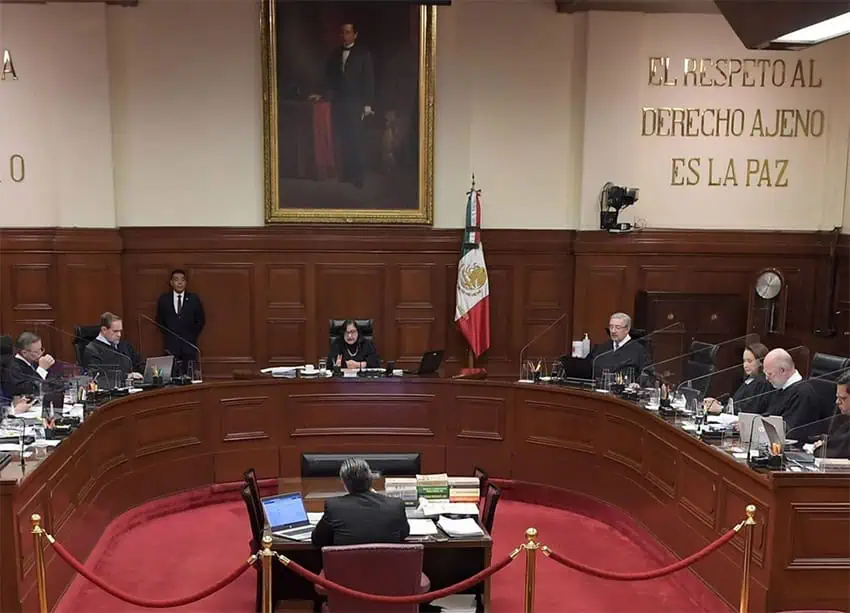
Continuing a lengthy address that the president herself described as “brief,” Sheinbaum highlighted that:
- Indigenous and Afro-Mexican communities will have their own “social infrastructure” budgets “for the first time in history” in 2025.
- This year will be dedicated to “the Indigenous woman in order to extol the origin of Mexico and recognize and give a voice to those who they wanted to silence for so many years.”
- Millions of Mexicans, including senior citizens, people with disabilities, public school students and women ages 63 and 64, will receive financial assistance from the government in 2025.
- Some 845,000 people will work in the government’s Youths Building the Future and Sowing Life employment schemes in 2025.
“We said we were going to provide continuity to and increase the social programs. … It’s very simple — the money that was previously stolen or used to buy votes … is today distributed for the benefit of all the people of Mexico,” Sheinbaum said.
The president also said that:
- The federal government will build 20 new high schools this year.
- Six new campuses of the Rosario Castellanos University will open.
- Mexico will become “a scientific power” in the coming years.
- Over the next six years, the government will build 1 million homes for people earning low salaries.
- A constitutional reform bill proposing a ban on the planting of genetically modified corn will be presented to Congress this month.
- The state-owned airline Mexicana — which last week discontinued almost half its routes — “will continue being the airline of the people of Mexico” and will be strengthened this year when it takes possession of new planes.
- The construction of infrastructure to allow freight trains to run on the Maya Train railroad will commence this year.
- Construction of new passenger train projects will commence in April.
- A range of highway projects will be undertaken in 2025.
- A recently-approved energy reform will strengthen the Federal Electricity Commission and state oil company Pemex.
Sheinbaum defends Mexicans in the US and reiterates belief that Trump will respect Mexico
Ahead of Trump’s return to the White House and the commencement of what the U.S. president-elect has said will be the “the largest deportation operation in American history,” Sheinbaum highlighted that Mexicans in the United States make a significant contribution to the U.S. economy.
While they contribute to the Mexican economy by sending home tens of billions of dollars in remittances every year, Mexican immigrants in the United States “contribute more to the U.S. economy because what they send to Mexico is just 20% of what they leave there in consumption, savings and taxes,” she said.
“Mexican workers work like no one else in the United States. They’re extraordinary workers in the fields, in construction, in services. They are great scientists in [U.S.] universities. They are heroes and heroines of the homeland,” Sheinbaum said.
The deportation of large numbers of Mexicans from the United States could significantly reduce the amount of money remitted to Mexico, where economic growth slowed significantly in 2024.
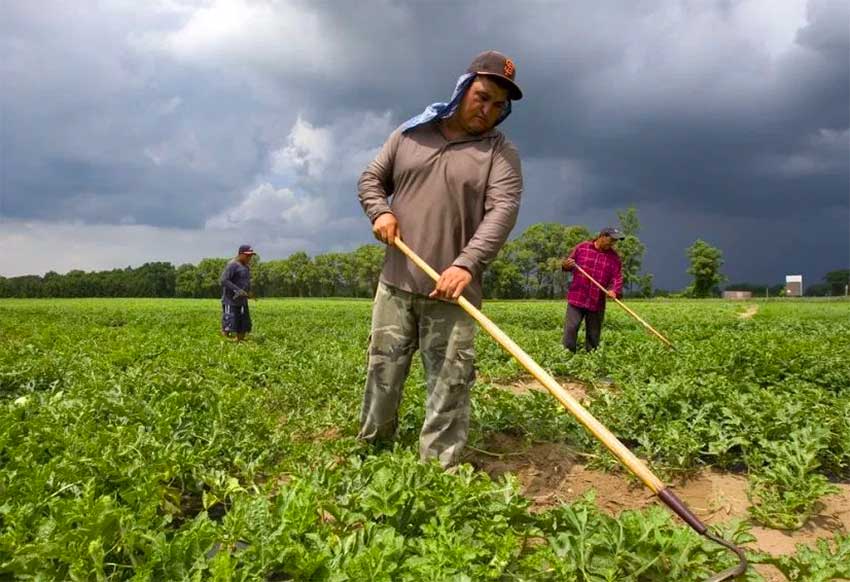
Approaching the end of her address, Sheinbaum acknowledged that there have been both “painful” and “good” times in the Mexico-United States relationship. She then highlighted that AMLO had “a good relationship” with Trump during his first term as U.S. president.
The president-to-president relationship was characterized by “respect” and “collaboration,” Sheinbaum said before emphasizing the benefits the USMCA trade pact — which is scheduled for review in 2026 — has brought to each of Mexico, the United States and Canada.
She subsequently said she was “convinced” that the relationship between Mexico and the United States will continue to be “good” and based on “respect” during Trump’s second term, even though the former and soon-to-be president has pledged to impose tariffs on all Mexican exports.
“Our vision is Mexican humanism, fraternity between peoples and nations,” Sheinbaum added before stressing that Mexico is a “free, independent and sovereign country” that collaborates with other nations but will never accept subordination.
“Rest assured that I am dedicated body and soul to the good of our people and the nation,” the president said at the tail end of an address that she concluded by wishing long life to “our migrant brothers in the United States,” the “fourth transformation,” the “people of Mexico” and — of course — Mexico itself.
By Mexico News Daily chief staff writer Peter Davies ([email protected])
